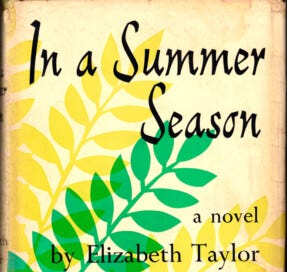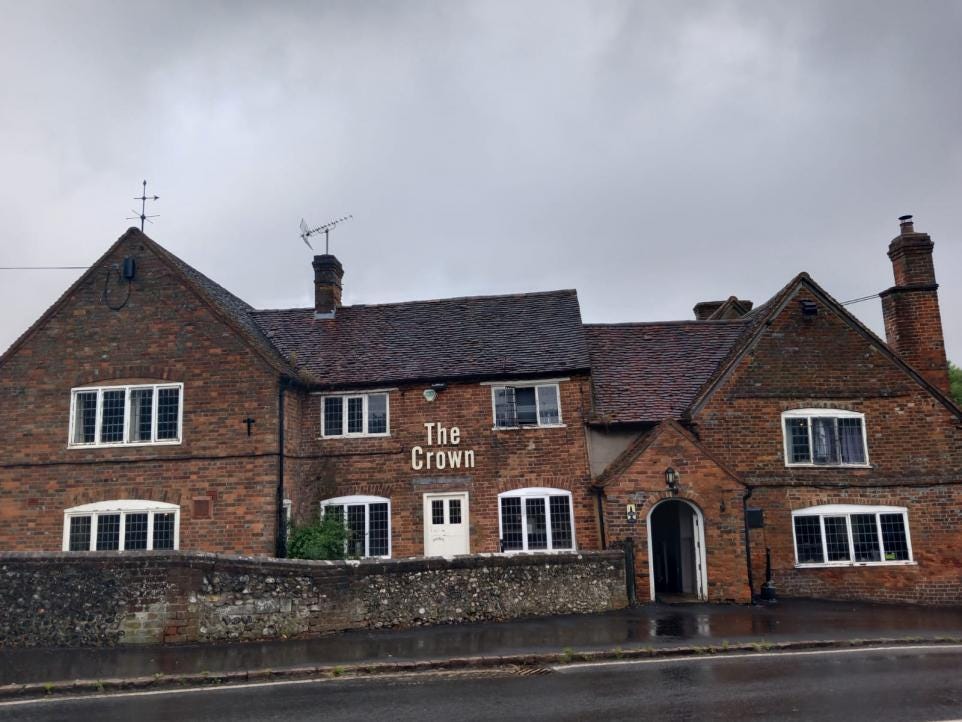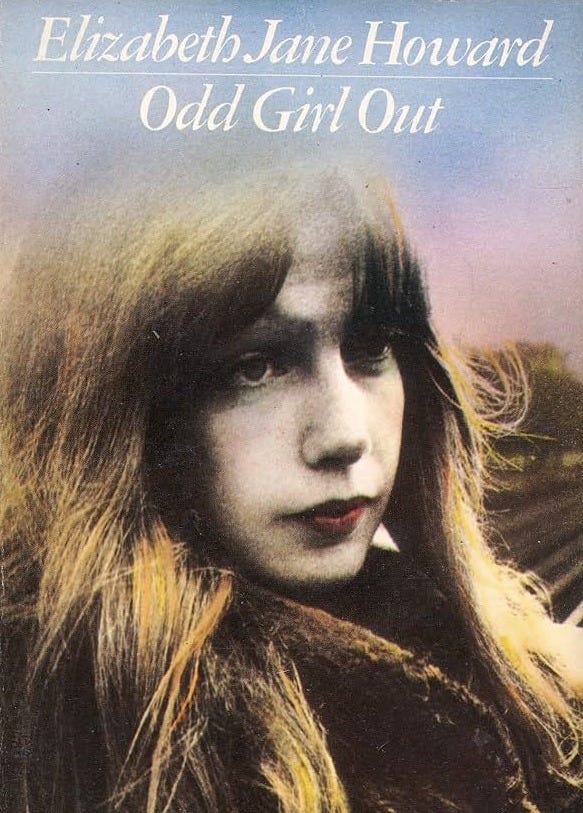You’ll have to promise not to talk about the heat, says William Hurt in that sexy piece of neo-noir for the Reagan era, Body Heat, but having just tipped a tray of ice down my T-shirt I’m afraid it is all I can think about, so here we go. Having much enjoyed posts about various summer reads (including from
and ) I wanted to offer a couple of my own, plus attendant thoughts on the authors. Much longer than I intended - because it is pure joy to write on the Elizabeths - and with a sizeable chunk of free, then a free trial option should you wish it.The idea of a ‘beach read’ has always slightly appalled me, with its implication that it is impossible to take in both the sun and prose more substantial than a mini Magnum. At the same time I cannot imagine the pages of Martin Chuzzlewit reeking gently of Ambre Solaire. But some novels fairly beg to be savoured at this time, and as a great re-reader I always find myself drawn back to two in particular.
In a Summer Season by THE Elizabeth Taylor, published 1961, is her eighth novel. It is the story of a well-to-do widow, Kate, an attractive middle-aged woman with an established ménage at her substantial Home Counties property - two children, aunt, cook - who has made a second marriage, not too obviously unwise, to Dermot, a younger and somewhat feckless man to whom she is in physical thrall.
The plot is simple, with a quality of the pre-ordained. The atmosphere is the point of the exercise, and its quality - of the magically sunlit, the voluptuous, the drenched, the pleasurably-dangerously destabilizing - seethes beneath the controlled prose: it is a book thickened by desire, Body Heat for the well-mannered gin-drinkers of Buckinghamshire.
… the extreme sensation, when it had seemed to swing her dizzily into the air, dropped her again. She felt weak, as hollow as an empty shell, and he counted her heartbeat settling slowly to its usual pace. He took his hands out of her shirt…
Elizabeth Taylor, born 1912, is one of my very favourite novelists, often misunderstood in her short lifetime. She died aged just sixty-three, and one mourns the writing that she never did, although thank God nobody ever blundered in with one of those ventriloquized tribute act novels - she, more than almost any writer I can think of, would be inimitable, not least because she would seem not to be. One would assemble the middle-class milieu, and write about it in a cool, compressed, ironized way, so far so good. But the mysteries of her technique - its boneless density; the disparate sentences that create a sense of space in between them, rising up as eloquent as the words - would be missing. In fact thinking about ET makes me realize the absolute useless stupidity of literary AI, whose tricks it has become slightly fashionable to admire even as they reveal their inadequacy. Elizabeth Taylor’s gift is for the unsaid, as well as the said. How to replicate that?
But then, in her own lifetime, this gift was mistaken for genteel reticence. Not by everybody - for a heady span the New Yorker published anything she gave them. Elizabeth Bowen was an admirer, as in her caustic way was Ivy Compton-Burnett, and so too (more on this later) was Elizabeth Jane Howard. Nevertheless she was far too widely regarded as a ‘writer for women’, a description designed to imply limitations. It is a label, in fact, and liable to be stuck upon any of the novelists whom I think of as a mid-twentieth century pantheon, a pantheon of women, who repurposed the form - after modernism, before feminism - as a close examination of the female condition. Daughters of Austen, shaped by war, by the domestic sphere, by the need to keep up appearances because they will get you a man, and by intimations of rebellion that might yet save them from weekly hair appointments. The Elizabeths, the Penelopes, as they are sometimes called - not always patronizingly, although they were all at times patronized; including the last of them, Anita Brookner; and none more strikingly than Elizabeth Taylor.
The reason for this is quite simple. She appeared to be exactly the kind of woman who features in her own books. In a sense, she was that woman. She was Kate from In a Summer Season: good-looking, well-groomed, gin-aperitifs-and-dinner-parties, Home Counties housewife and mother of two. It was not an act, this was her life. She looks as if she never had to wash her own gloves, said Ivy Compton-Burnett. I felt guilty to be married, Elizabeth commented after a lunch with Ivy.
In fact Elizabeth Taylor is the novelist who confronted - and, for many years, resolved - the conundrum posed by the pram in the hallway: she wrote thirteen novels and quantities of short stories while living what would have been called a ‘normal’ woman’s life. Her husband was a successful and occasionally adulterous businessman, and she had the inner world that made everything different, as writing does. (She was also a former Communist who became a member of the Labour party, which as a decorous finger-flip always amuses me).
Only when Mr Taylor retired did Elizabeth find that her other sphere of existence - the writing, the ongoing liberating commentary on her Kate life - had been invaded. A certain well-behaved passivity in her nature seems to have prevented her from dealing decisively with the man about the house and putting her work first; this is so inimical to us that the mere thought of it makes me fidget with agitation, but it is the clearest possible example of how different things were for women - even this woman, revered by the New Yorker but, at the time of her marriage in 1936, the financial supplicant. Marriages, life arrangements, opportunities, expectations. So, so different. And these truths formed much of the substance of Elizabeth’s novels. They were not politicized, they were just set down, which is what I most love about them, but is also why her reviewers tended to look on her as a bourgeoise who wrote novels for the bourgeoisie, and why they said so in criticisms so viciously dismissive that one could scream.
Yes, her general milieu is middle-class, which as yet is not a crime against literature. But it left her open to a very particular kind of snobbery.
The irony is that Elizabeth Taylor knew all about real life - some literary types merely prefer the idea of it - which goes on even in Buckinghamshire (I grew up there, so I know).
She understood completely - for instance - the nature of an alliance between a Kate and a Dermot, the constant shifting power balance: Kate is vulnerable because older, and because although Dermot loves her he loves himself far more; but of course she has the money; but this in turn gives Dermot the obscure right to be resentful, to rebel, as he inevitably - yet somehow breathtakingly - does…. And then, the delicious little passage in which Dermot describes being given a tip for the winner of the 1954 Derby, who ‘romped all the way home like a child off to a party’. And a wonderful early scene in a pub, which threatens very faintly the edifice of the marriage (‘“I think it’s you who is being difficult, you know. Darling Kate”, he added’)… Elizabeth’s great delight was pubs. She would walk alone of an early evening to her local, The Crown at Penn, where she sat in happy silence with her ears opened to the smoky air. Her gift for replicating pub chat – codified, Beckettian, reassuring, poignant – was formidable. So too her handling of group scenes - she thought of herself as a scenic writer - in which the baton of perspective is handed seamlessly between characters. In a Summer Season contains a hilariously terrible dinner party, attended by random guests including the local priest, her son’s Spanish girlfriend, Kate’s aunt Ethel (nose dabbed with talcum powder) and her father-in-law, Sir Alfred, who has so much money that he feels able to play by his own rules.
… Father Blizzard, noticing a look of bewilderment on Ignazia's face — for Ethel had been shouting slowly, to make herself understood, mouthing words carefully at her — began shyly to say a little to her in Spanish. His hesitancy embarrassed him, but her expression of interest and relief made him persevere.
Showing off, Sir Alfred thought. After all, the only reason these foreign girls come here is to learn English — wasting their time to talk to them in their own language, and not very civil to the rest of us. "I certainly have a very fine old mahogany sideboard," he told Edwina in a loud voice.
In a Summer Season is deeply comedic - Ethel a particular source, obsessed as she is with the Kate-Dermot relationship (‘Ethel had a way of bending her head at closed doors, not listening, as she told herself, but ascertaining’) - although it is the comedy of tension, of facades, beneath which palpate the great currents of desire that inform the book and direct its course. Not a single explicit phrase, naturally. It is in fact very hard to say how Elizabeth Taylor gets her astonishing emotional effects (I can scarcely think of a more moving love affair than the one she conjures in A Game of Hide and Seek), although what is sure is that her technique is far bolder than is apparent. There is not a trace of blatancy in the way that In a Summer Season is permeated by heat, by summer - ‘On this first sunny evening of the year the house had all its windows thrown open, as if of itself, like a flower, it had responded to the sun’ - yet one feels it throughout, the pagan element rampaging through the usual rules of behaviour.
Which takes me to Elizabeth Jane Howard, the woman who - along with her third husband Kingsley Amis - introduced me to the writing of her friend Elizabeth Taylor. She did so, in fact, in my other seasonal read, Odd Girl Out (1972), in which a character is described as forcing herself to abandon The Wedding Group in order to get back to her weeding. It is surely unusual for such a recent novel - 1968 - to be mentioned in this way, and a very lovely tribute (although I think The Wedding Group is ET’s worst book - which is not the point).
As with the other Elizabeth, EJH was sometimes misunderstood and often overlooked. Not least because of her appearance, which she most certainly kept up, seeing it as a matter of duty as much as anything: her novels are enticingly full of details - scent, cosmetics, clothes - illuminating her mantra that ‘one could never take too much trouble’. Nobody does this better, but her exquisite sensitivity to surfaces meant that she, too, became a ‘writer for women’.
If ET was patronized for being a good-looking, well-groomed, rich man’s wife, then EJH’s glamorous allure made her the target of a different kind of snobbery; she was so beautiful, and so often the adjunct to clever men about town - Koestler, Tynan, Cecil Day-Lewis - that her talent was viewed as suspect. Still more so when, in 1962, she began her eighteen-year relationship with Kingsley Amis. Consider that atrocious anecdote in Slipstream when she tells the then literary editor of The Observer. who is bowing down before Amis, that she has just finished her latest novel. ‘That must be a good thing’, he replies (GOD how I hate that tight-lipped idiom) then goes back to his fawning. Well: even from beyond the grave, revenge is sweet, and EJH now of course outsells her former husband. (Whom I also, incidentally, greatly admire).
I completely agree with the brilliant
that the Cazalet books - which brought her success - are not EJH’s finest, although they are astoundingly immersive. But the necessary crack-on-with-it nature of the saga means a loss of delicacy, of intricacy, of the elegantly detailed workings of style that she displayed in The Beautiful Visit, The Long View, The Sea Change, After Julius - the pre-Amis novels, in fact (After Julius was written in the very early days of their relationship, when mutual respect was sexy in itself).These to my mind are significant books. Nothing about them, indeed, was too much trouble. But with marriage to Amis came the old dilemma: life v work, the one that Elizabeth Taylor so intriguingly solved for a time, but that for EJH was complicated by her partner also being a writer (having tried this myself, I am not a fan); and one who was earning far more money and therefore wielding the power. Gradually she put her own career second to his and, as described in Slipstream, her sense of self evaporated. This was partly a question of her nature - her behaviour seems not untainted by masochism - but for sure it was connected to the literary establishment’s view that Amis’s books were more ‘important’.
Keep reading with a 7-day free trial
Subscribe to Laura Thompson’s Substack to keep reading this post and get 7 days of free access to the full post archives.









